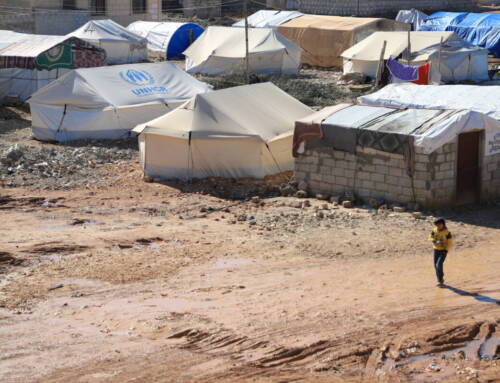National Council member: Hezbollah strategy to undermine Lebanese state
June 24, 2013 The spillover of Syria’s war into Lebanon […]
24 June 2013
June 24, 2013
The spillover of Syria’s war into Lebanon is nothing new, says Osama Edward, 35, director of the Assyrian Human Rights Network and a member of the Syrian National Council. Edward, originally from a village near Qamishli, tells Abdulrahman al-Masri from Stockholm why bringing the battle into Lebanon means a victory for Hezbollah.
Q: In your opinion was the battle of Qusayr the beginning of the spillover of fighting into Lebanon?
A: Of course Qusayr has strategic importance, but not to the degree of being an armageddon. The spillover of the Syrian crisis is an ongoing thing: the political conflict and the political overlap between Lebanon and Syria.
The active intervention of Lebanon in Syria and the export [of the Syrian conflict] to Lebanon began nearly a year or a year and a half ago with the events in Tripoli and the continuing clashes between [groups in] Jabal Mohsen and Bab Al-Tabbaneh. [Clashes spread] yesterday to Sidon between a group of Ahmed Al-Assir supporters and a group from Hezbollah, and there are constant political clashes between the March 8th and March 14th alliances, each of whom has taken a clear position on the Syrian revolution.
Q: What does the spillover of the crisis into Lebanon mean?
A: Inside Lebanon, it means victory for the alliance that is led by Hezbollah, including March 8th and Amal. That will mean the effective downfall of freedom and stability in Lebanon, that which is espoused by the powers of March 14th.
Q: What is your opinion on the Lebanese government’s position and its treatment of the Syrian crisis?
A: The Lebanese government is an impotent government and the government of Najib Mikati does not have a lot of power. Even the Parliament was extended for show. It is disabled somehow because of the majority hijacked by Hezbollah.
The Chamber of Deputies is no longer able to perform its job. Then [we have] the Lebanese army, which has launched a number of calculated, targeted operations since the assassination of the Christian officer, Samer Hanna, in the south of Lebanon.
The reputation of the Lebanese Army has been [under suspicion], and yesterday the newspaper Al-Nahar published a picture of clashes in Sidon showing a Lebanese Army tank and walking nearby it a group of militants and a group of citizens, [implying] that the Lebanese Army is not able to do anything but watch the fighting unfold.
Recently this crippling of [governmental authority] has even [involved] the president of the Republic, with Hezbollah broadcasting on its media channels its shelling, so as to undermine the presidency’s autonomy and reputation in Lebanon, allowing Hezbollah to gain complete control of Lebanon.
Q: According to your information, is there a division among the Shiite sect in Lebanon on the issue of Hezbollah’s intervention in Syria?
A: Regardless of whether the reason was armaments, social aid, political channels, or religious ideology, the majority of Shiites in Lebanon stand behind Hezbollah and the March 8th Alliance.
Hence the other side is not influential, even knowing the support of such Shiite elite as Sheikh Sabhi al-Tafili and Sheikh Ali al-Amin, and even though we saw the Lebanese Option Party demonstrate in front of the Iranian embassy. There has been comprehensive, systematic, intentional targeting of Shiites who [oppose Hezbollah], including an attack on Shiite Minister Muhammad Ahmed Beidoun of Amal, who had previously defected, and a journalist.
They all, however, in one way or another, are under the pressure of Hezbollah. The influence [of these Hezbollah opponents] is very limited in the Lebanese public sphere, but I have no doubts at all about nobility and sincerity of these Shiite intellectuals.






